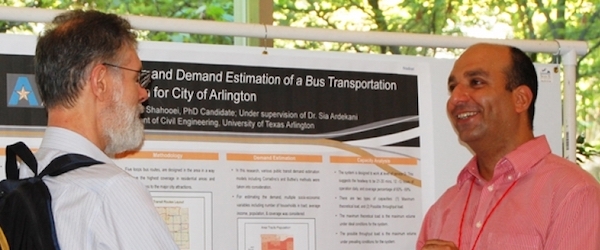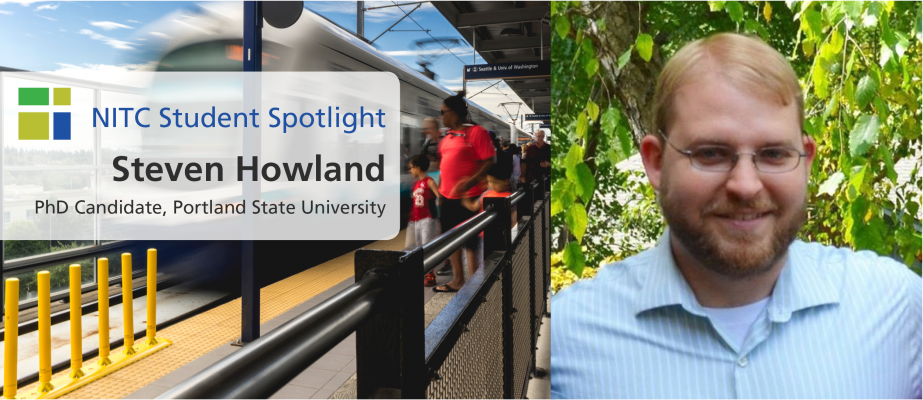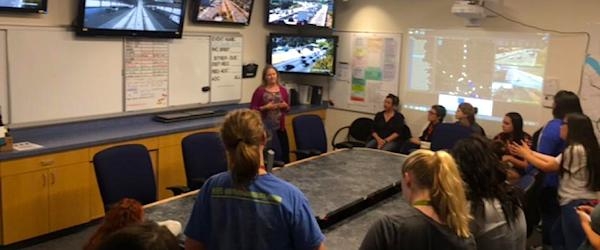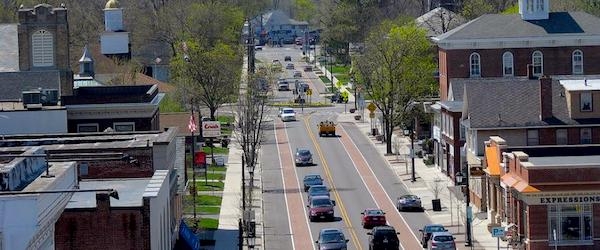2017 TCS Recap: View slides from the breakout sessions and workshops, see PDFs of the posters, revisit the PechaKucha presentations, or read instructions for recording your continuing education credits.
The two-day 2017 Transportation and Communities Summit, held at Portland State University (PSU) on September 11–12, drew 315 attendees from over 10 states and over 40 cities and towns. This was the largest summit we’ve ever hosted, and we hope it created new opportunities for collaboration between researchers and practitioners.
This event was sponsored by the National Institute for Transportation and Communities (NITC), a national university transportation center managed by TREC housed at PSU. NITC is a partnership between PSU, the University of Oregon, the Oregon Institute of Technology, the University of Utah, and our newest partners - the University of Arizona and the University of Texas at Arlington.
NITC researchers at all six of the partner universities were introduced in a series of "Meet the Researcher" tweets and videos, to familiarize attendees with the research interests of NITC faculty and to open...
Read moreSteven Howland, PhD Candidate in Urban Studies at Portland State University
In addition to being a student, Steven has also acted as a researcher on a number of TREC projects:
- Suburban Black Poverty in East Portland: The Role of Transportation in Making Ends Meet
- Evaluating Efforts to Improve the Equity of Bike Share Systems
- Peer-To-Peer Carsharing: Short-term effects on travel behavior in Portland, OR
Learn more about Steven by checking out his researcher profile, following him on Twitter @SHowland886, or read his recently published article in Metroscape Magazine "The Geography of the Commute".
Tell us about yourself:
I am Steven Howland, a PhD candidate in Urban Studies, where I specialize in economic development and poverty with particular interest in the intersections of the two with transportation issues. I hold a Bachelor's and Master's in Planning from Arizona State University. My dissertation looks at the transportation...
Read moreIn 2011, San Fransisco introduced SFPark, a smart parking...
Read moreLearn more about this research project by viewing the two-page Project Brief, related presentations, and the full Final Report.
In Tampa Bay, Florida, it's hard to get around without a car. For those who depend on transit, the simple task of bringing groceries home can take up an entire afternoon.
Add the extra difficulty of food insecurity—which affects a wide variety of people and may mean they can't afford to go to the grocery store, but must travel to a food pantry—the task of procuring those groceries gets even more difficult.
Now take away the possibility of transit. Where does that leave you? Hungry, wherever you are.
According to a new study from NITC investigators at the University of South Florida (USF), there are 136,401 people in Florida's Hillsborough, Pasco and Pinellas counties who are both food insecure and lack adequate access to transit.
Food insecurity affects a wide range of people and most acutely affects vulnerable populations such as children, pregnant women, seniors and individuals with disabilities.
The study, led by...
Read moreNineteen girls presented ingenious transportation ideas to a packed room on Friday, August 18, the closing day of TREC's 2017 National Summer Transportation Institute (NSTI). For two weeks, the high schoolers had stayed in Ondine Residence Hall on the Portland State University campus; meeting for daily lectures at PSU's Engineering Building, hearing from some of the women who run transportation systems in Portland, Oregon and touring the city's agencies.
In between guest lectures and field trips, the NSTI class worked on group projects, which they presented at Friday's closing event to their family members and the course instructors.
On the first day of the camp, they were asked to think about a real-world transportation problem so they could use the skills they would gain to present a solution at the end of the course. The problems were real, and the solutions were impressive.
It might be because the guest lecturers were actual practitioners, who gave real talk about the issues they've encountered in their work and how they've tried to solve them.
It might also be because the curriculum was directed by TREC's own amazing Lisa Patterson and Ellee Stapleton along with...
Read moreLearn more about this research by viewing the two-page Project Brief, related presentations, and the full Final Report on the Project Overview page.
As cities aim to promote sustainable, multimodal growth, sometimes the way we go about development review processes can create barriers to achieving the results we want. Some of the methods we have inherited, while still useful, have distinct limitations.
NITC dissertation fellow Kristina Currans took on this challenge in her doctoral research project, Data and Methodological Issues in Assessing Multimodal Transportation Impacts for Urban Development.
The guidelines for evaluating transportation impacts of new development were originally published in 1976 by the Institute of Transportation Engineers (ITE). Decades later, we’re still using essentially the same processes all across the U.S. and Canada, and these methods—which harbor a lack of...
Read moreTransit-oriented development, or TOD, could be the “poster child” for sustainable urban development. It concentrates land uses, including commercial and multi-family housing, near transit stations so as to reduce car dependency and increase ridership. The benefits are manifold; increased community health, positive economic impacts, less harm to the environment and potentially greater social equity.
But what about affordability? In exchange for all these benefits, do TOD residents spend more money on transportation?
A new NITC ...
Read moreNormally we assume that travel is a means to an end, but the latest NITC report examines other benefits of travel—aspects that aren’t about reaching a destination.
One such benefit is travel-based multitasking. A good example of this is using time on a commuter train to listen to music, relax or get some work done. The simple enjoyment of a walk in the fresh air relates to another benefit, known as subjective well-being, in which the act of travel itself makes a person feel better. These intrinsic benefits can impact travel behavior and mode choice, but our current models don’t have any way to reflect this.
NITC fellow Patrick Singleton investigated the policy and planning implications of this in his dissertation, Exploring The Positive Utility Of Travel And Mode Choice.
"The way we analyze travel behavior assumes people want to get from A to B as quickly as possible. We don’t include the...
Read moreThe National Institute for Transportation and Communities (NITC) is now accepting proposals for Small Starts grants and Dissertation Fellowships.
- Small Starts proposals are due September 15, 2017.
- Dissertation Fellowship proposals are due October 23, 2017.
SMALL STARTS
The purpose of a Small Starts grant is to assist researchers who are interested in transportation but have not had an opportunity to undertake a small project consistent with NITC's theme of Improving the Mobility of People and Goods to Build Strong Communities.
The NITC theme connects directly with the U.S. DOT priority of improving mobility of people and goods to build strong communities. All proposals must be consistent with this theme, as defined in the request for proposals.
Faculty members and research faculty eligible to serve as Principal Investigators (PIs) at our partner universities: Portland State University, Oregon Institute of Technology, University of Arizona, University of Oregon, University of Texas at Arlington and University of Utah may submit proposals and serve as PIs with NITC.
Read more about Small Starts grants,...
Read more









